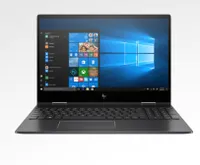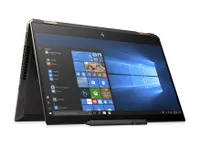When buying a business laptop, it can be hard to know which specs matter the most and which ones are ultimately less important for productivity, especially if you don’t have a great understanding of how computers work. If that’s you, don’t worry; this article will go over the most important specs to pay attention to when buying a business laptop, as well as why those specs matter.
#1: The processor matters most
Out of all of the different components found in business laptops, the most important is the processor. This is because processors are essentially the “brain” of the computers they’re in.
Because of how crucial the processor is, making sure that you pick a laptop that has a powerful, fast processor is crucial. Notably, the most advanced type of processors you can get in a business laptop right now are Intel’s 11th Gen chips, as they are faster and more capable than other options.
#2: Memory is a close second
While random access memory, or RAM, is less important than the processor, it’s nevertheless a crucial component. If you don’t have enough RAM in your system to keep up with your tasks, your system will slow down.
Generally, making sure that the laptop you’re looking at has at least 8GB of RAM is ideal for basic productivity. 16GB or more is beneficial if you engage in more intensive workloads such as editing video and images.
#3: Don’t overlook storage
The third most important component is storage. Not having enough storage can prevent you from keeping lots of work files stored on your system without deleting some, which is a pain. This is especially important if you’re someone who needs to work with video files and large images.
Typically, 256GB is enough for basic productivity, while 512GB or more is ideal for the long term.
#4: Pick out the right display for you
The type of display you choose typically won’t have much of an impact on the majority of productivity work you do, but it’s worth giving consideration nevertheless. If you want maximum battery life and you’re solely working with text documents, a standard FHD display will be sufficient.
If you work with photos or videos and would benefit from a higher resolution, opt for a 4K panel. Additionally, it’s also good to make sure the screen you’re choosing has at least 250 nits of brightness since anything dimmer will fail to effectively counter sun glare. Features like touch support and anti-reflective coatings are valuable as well, but for most people they generally aren’t dealmakers or breakers.
#5: Graphics cards are worth a look
Graphics cards are generally the least important part inside of business laptops. This is because most productivity work involves simple text documents or text-focused programs, and even the simplest of integrated graphics solutions will be just fine for viewing media on the web. However, if you plan on doing any editing of visual media, it’s worth paying attention to the graphics card a business laptop has.
For light photo or video editing, you can usually get by with a standard integrated graphics card. However, for serious work, you’re going to want to look into discrete graphics solutions such as NVIDIA’s MX250. Notably, the integrated Intel Xe graphics on 11th Gen Intel processors outperform many discrete solutions, including the aforementioned MX250.
What laptop has great components across the board?

If you’re looking for a device that has excellent specs in all five of these categories, look no further than HP Intel Evo laptops like the HP Envy x360 and the HP Spectre x360. Powered by fantastic 11th Gen Intel processors, these laptops have power and speed where it matters most. In addition, they come with plenty of RAM and storage space, and they also have excellent FHD or 4K displays that are more than bright enough.
Additionally, you can buy configurations with touch or anti-reflective screens , which is a nice bonus. The icing on the cake is the Intel Xe graphics solution that comes with the 11th Gen Intel processors, as they are more than capable of handling a variety of productivity workloads.
The HP Envy x360 is better for folks who want to save money while still getting great performance, as it’s positioned as a mainstream laptop that suits a wide variety of users. It’s not as capable as the Spectre, but the fact that it’s more affordable makes it appealing to a wider range of people.
The HP Spectre x360 is the device to go for if you want premium quality and ultimate performance. It may be a little more expensive than the Envy, but it also has more power and can be used like a tablet thanks to the fact it’s a convertible device.
HP ENVY x360
The HP ENVY x360 is your best bet if you’re looking for a great balance between price and performance. It’s capable, affordable, and features a sleek, attractive design.
HP Spectre x360
The HP Spectre x360 is the definition of high quality. It delivers even stronger performance than the HP ENVY x360 and features an even more attractive and premium chassis, all while still remaining fairly affordable (though it will set you back more than the ENVY will). It comes in 13-inch and 14-inch variants.
Get Tom's Hardware's best news and in-depth reviews, straight to your inbox.

